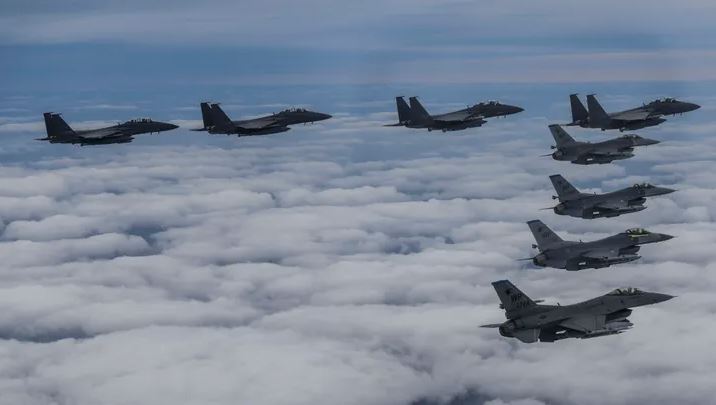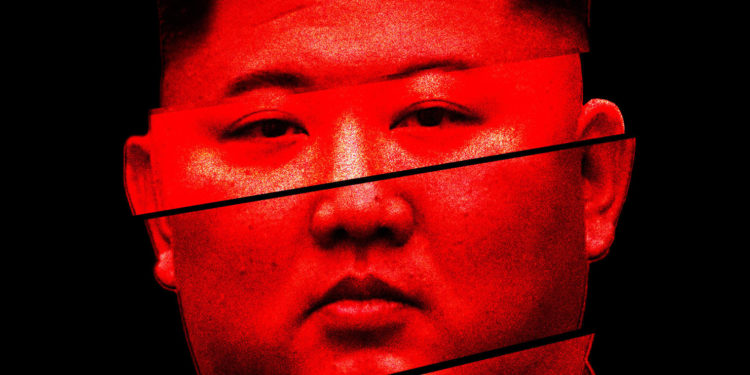
Revelations 6:3-4 “when he opened the second seal, I heard the second living creature say, “Come!” 4 And out came another horse, bright red. Its rider was permitted to take peace from the earth, so that people should slay one another, and he was given a great sword.
Important Takeaways:
- South Korea issues air raid alerts after North Korea fires short-range ballistic missiles
- Air raid sirens sounded on a South Korean island and residents evacuated to underground shelters after North Korea fired more than 20 missiles
- At least one of them in its direction and landing near the rivals’ tense sea border. South Korea quickly responded by launching its own missiles in the same border area.
- The launches came hours after North Korea threatened to use nuclear weapons to get the U.S. and South Korea to “pay the most horrible price in history” in protest of ongoing South Korean-U.S. military drills that it views as an invasion rehearsal.
- The White House maintained that the United States has no hostile intent toward North Korea and vowed to work with allies to curb North Korea’s nuclear ambitions.
Read the original article by clicking here.

Revelations 6:3-4 “when he opened the second seal, I heard the second living creature say, “Come!” 4 And out came another horse, bright red. Its rider was permitted to take peace from the earth, so that people should slay one another, and he was given a great sword.
Important Takeaways:
- North and South Korea exchange warning shots along disputed sea boundary amid heightened tensions following North Korea’s recent barrage of missile tests
- South Korea’s military says its Navy fired warning shots to repel a North Korean merchant ship that it claims violated the sea boundary.
- North Korea’s military said it responded by firing 10 rounds of artillery shells as a warning to South Korea.
- The incident comes amid heightened tensions over North Korea’s recent barrage of missile tests, which in turn led to U.S. and South Korean warplanes conducting bombing drills.
Read the original article by clicking here.

Revelations 6:3-4 “when he opened the second seal, I heard the second living creature say, “Come!” 4 And out came another horse, bright red. Its rider was permitted to take peace from the earth, so that people should slay one another, and he was given a great sword.
Important Takeaways:
- North Korea flies 12 warplanes near South Korean border, prompting Air Force scramble
- The South Korean military says it detected eight fighter jets and four bombers in the North Korean formation. South Korea’s flight of 30 warplanes did not engage the sortie, however, and only guarded the country’s airspace. The flight is only the latest aggression to come from Kim Jong Un’s regime, which has launched numerous ballistic missiles in recent weeks.
Read the original article by clicking here.

Revelations 6:3-4 “when he opened the second seal, I heard the second living creature say, “Come!” 4 And out came another horse, bright red. Its rider was permitted to take peace from the earth, so that people should slay one another, and he was given a great sword.
Important Takeaways:
- Pelosi stares down North Korea with visit to the DMZ – as China continues to fire missiles into Japan’s exclusion zone: White House is ‘FUMING’ with Nancy over Taiwan trip and fact she IGNORED advice not to go
- Pelosi visited the heavily-fortified DMZ during her trip to South Korea
- She was the highest-ranking U.S. official to visit the area since President Donald Trump met North Korean dictator Kim Jong Un there in 2019
- The 155-mile-long, 2.5-mile-wide zone separates North and South Korea
- South Korean president Yoon Suk-yeol told Pelosi her trip to the DMZ was ‘a sign of strong deterrence between South Korea and the US against North Korea’
- Pelosi now in Japan – her last stop on her South Asia tour
- Tokyo said five Chinese missiles landed within its exclusive economic zone
- It was part of military exercises launched by Beijing in response to Pelosi’s Taiwan visit, which China is still angry about
- White House officials said to be fuming over Pelosi’s Taiwan trip
Read the original article by clicking here.

Revelations 6:3-4 “when he opened the second seal, I heard the second living creature say, “Come!” 4 And out came another horse, bright red. Its rider was permitted to take peace from the earth, so that people should slay one another, and he was given a great sword.
Important Takeaways:
- U.S. to Enrage Kim Jong Un With Assassination Dry Run
- The U.S. and South Korea are about to play war games again, and this time they’re going for the jugular.
- For their first joint military exercises in five years, the Americans and South Koreans will polish up what military people here call the “kill chain” in which they target the North’s missile and nuclear sites plus bases needed to supply, refuel, and rearm them.
- Although it’s only a game, he’s sure to take it personally as he did in September 2017 when he ordered the North’s sixth, and most recent, nuclear test after that year’s war games.
- “If you get the head of the military forces (which is Kim Jong Un), theoretically you gut the head of the snake.”- David Maxwell, retired U.S. Army Special Forces colonel
Read the original article by clicking here.

Revelations 6:3-4 “when he opened the second seal, I heard the second living creature say, “Come!” 4 And out came another horse, bright red. Its rider was permitted to take peace from the earth, so that people should slay one another, and he was given a great sword.
Important Takeaways:
- U.S., South Korea to Expand Military Drills as Kim Threatens Nuclear War
- On Thursday, North Korean leader Kim Jong-un threatened to use nuclear weapons, in the event of any confrontation with the U.S.
- “Our armed forces are completely prepared to respond to any crisis, and our country’s nuclear war deterrent is also ready to mobilize its absolute power dutifully, exactly, and swiftly in accordance with its mission,” Kim said
- In response, the United States and South Korea announced that they will expand a planned upcoming joint military exercise, and they will “restart their strategic dialogue on extended deterrence.” The agreement was reached between South Korean defense minister Lee Jong-sup and U.S. secretary of defense Lloyd Austin.
Read the original article by clicking here.

Revelations 6:3-4 “when he opened the second seal, I heard the second living creature say, “Come!” 4 And out came another horse, bright red. Its rider was permitted to take peace from the earth, so that people should slay one another, and he was given a great sword.
Important Takeaways:
- North Korea’s Kim says ‘ready to mobilize’ nuclear weapons
- In Kim’s latest speech to mark the armistice that ended fighting in the Korean War — known as “Victory Day” in the North — he said the country’s armed forces were “thoroughly prepared” for any crisis.
- “Our country’s nuclear war deterrent is also ready to mobilize its absolute power faithfully, accurately and promptly in accordance with its mission,”
- The North has carried out a record-breaking blitz of sanctions-busting weapons tests this year, including firing an intercontinental ballistic missile at full range for the first time since 2017.
- Nuclear talks between Pyongyang and Washington have been stalled since a summit between Kim and then-US president Donald Trump in February 2019 broke down over sanctions relief
- The Kim regime has since rejected Washington and Seoul’s repeated offers to resume talks, claiming the United States must first drop its “hostile” policies.
Read the original article by clicking here.

Matthew 24:6 You will hear of wars and rumors of wars, but see to it that you are not alarmed. Such things must happen, but the end is still to come.
Important Takeaways:
- The tit-for-tat missile launches were aimed at demonstrating the ability to respond swiftly and accurately to North Korean attacks
- South Korean and U.S. officials also say North Korea is preparing to conduct its first nuclear test since September 2017
- The United States has vowed to push for additional international sanctions if North Korea conducts a nuclear test
- Nuclear talks between Washington and Pyongyang have stalled since 2019 over disagreements in exchanging the release of crippling U.S.-led sanctions for the North’s disarmament steps
Read the original article by clicking here.

Revelations 6:3-4 “ when he opened the second seal, I heard the second living creature say, “Come!” 4 And out came another horse, bright red. Its rider was permitted to take peace from the earth, so that people should slay one another, and he was given a great sword.
Important Takeaways:
- South Korea ‘Fires Multiple Ballistic and Guided Missiles’ Following Alleged ICBM Launch by DPRK
- South Korea’s military said it fired “several ballistic and guided missiles” after North Korea’s ICBM launch.
- It added that it is “ready and capable” of precision strikes against North Korea’s missile launch locations and control systems “if needed”.
- The launch was also condemned by Japan, with Tokyo sending a protest note to Pyongyang. Emergency headquarters were established by Japan’s Prime Minister Fumio Kishida to gather and analyses information about North Korea’s alleged missile launch
- The US has also criticized North Korea’s actions, urging Pyongyang not to destabilize the situation further
- Should the infraction be confirmed, it will be North Korea’s 11th launch this year
Read the original article by clicking here.

Revelations 6:3-4 “ when he opened the second seal, I heard the second living creature say, “Come!” 4 And out came another horse, bright red. Its rider was permitted to take peace from the earth, so that people should slay one another, and he was given a great sword.
Important Takeaways:
- North Korea may be gearing up for a full ICBM test, just when U.S. attention is focused elsewhere
- Pyongyang is showing mounting signs it may be gearing up for a major weapons test – potentially its first since 2017 of an intercontinental ballistic missile that could threaten U.S. cities.
- South Korea, meanwhile, is planning its own solid-fuel space rocket test this month, in line with its plans to develop military satellites, which would be used to monitor North Korea.
- The next few months may lay the foundation for rocky inter-Korean relations during a time when U.S. attention is focused on the Russian invasion, with fewer resources to divert elsewhere.
- More than four years have passed since Pyongyang tested an ICBM capable of reaching the U.S. mainland. Since then, Kim Jong Un’s regime has shifted his focus to building a range of short- to intermediate-range missiles that can strike U.S. allies in the region.
Read the original article by clicking here.












